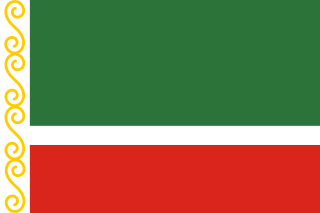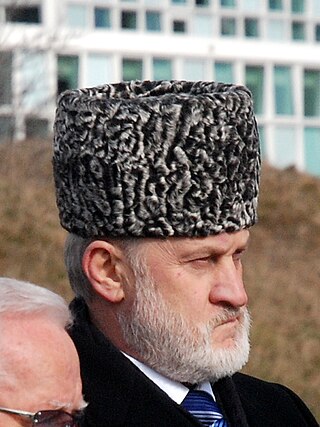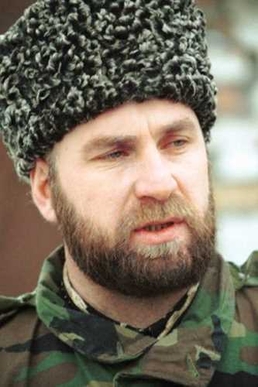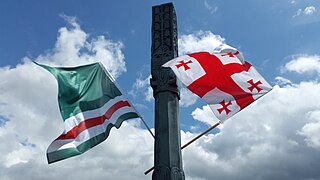
Chechnya, officially the Chechen Republic, is a republic of Russia. It is situated in the North Caucasus of Eastern Europe, between the Caspian Sea and Black Sea. The republic forms a part of the North Caucasian Federal District, and shares land borders with Georgia to its south; with the Russian republics of Dagestan, Ingushetia, and North Ossetia–Alania to its east, north, and west; and with Stavropol Krai to its northwest.

The First Chechen War, also referred to as the First Russo-Chechen War, was a struggle for independence waged by the Chechen Republic of Ichkeria against the Russian Federation from 11 December 1994 to 31 August 1996. This conflict was preceded by the battle of Grozny in November 1994, during which Russia covertly sought to overthrow the new Chechen government. Following the intense Battle of Grozny in 1994–1995, which concluded with a victory for the Russian federal forces, Russia's subsequent efforts to establish control over the remaining lowlands and mountainous regions of Chechnya were met with fierce resistance and frequent surprise raids by Chechen guerrillas. The recapture of Grozny in 1996 played a part in the Khasavyurt Accord (ceasefire), and the signing of the 1997 Russia–Chechnya Peace Treaty.

Akhmed Halidovich Zakayev is a Chechen statesman, political and military figure of the unrecognised Chechen Republic of Ichkeria (ChRI). Having previously been a Deputy Prime Minister, he now serves as Prime Minister of the ChRI government-in-exile. He was also the Foreign Minister of the Ichkerian government, appointed by Aslan Maskhadov shortly after his 1997 election, and again in 2006 by Abdul Halim Sadulayev. An active participant in the Russian-Chechen wars, Zakayev took part in the battles for Grozny and the defense of Goyskoye, along with other military operations, as well as in high-level negotiations with the Russian side.

The Second Chechen War took place in Chechnya and the border regions of the North Caucasus between the Russian Federation and the breakaway Chechen Republic of Ichkeria, from August 1999 to April 2009.
The history of Chechnya may refer to the history of the Chechens, of their land Chechnya, or of the land of Ichkeria.
The Chechens, historically also known as Kisti and Durdzuks, are a Northeast Caucasian ethnic group of the Nakh peoples native to the North Caucasus. They are the largest ethnic group in the region and refer to themselves as Nokhchiy. The vast majority of Chechens are Muslims and live in Chechnya, an autonomous republic within the Russian Federation.

Ramzan Akhmatovich Kadyrov is a Russian politician and current Head of the Chechen Republic. He was formerly affiliated with the Chechen independence movement, through his father who was the separatist-appointed mufti of Chechnya. He is a colonel general in the Russian military.

Ingushetia or Ingushetiya, officially the Republic of Ingushetia, is a republic of Russia located in the North Caucasus of Eastern Europe. The republic is part of the North Caucasian Federal District, and shares land borders with the country of Georgia to its south; and borders the Russian republics of North Ossetia–Alania to its west and north and Chechnya to its east and northeast.

Ruslan Germanovich Gelayev was a Chechen military commander and prominent military figure of the Chechen resistance against Russia. Albeit a controversial figure, Gelayev was commonly viewed as an abrek and a well-respected, ruthless fighter. His operations spread well beyond the borders of Chechnya and even outside Russia and into Georgia. He was killed while leading a raid into the Russian Republic of Dagestan in 2004.

The Chechen Republic of Ichkeria, known simply as Ichkeria, and also known as Chechnya, is a former de facto state that controlled most of the former Checheno-Ingush ASSR from 1991 to 2000 and has been a government-in-exile since.

Doku Khamatovich Umarov, also known as Dokka Umarov as well as by his Arabized name of Dokka Abu Umar, was a Chechen militant in the North Caucasus. Umarov was a major military figure in both wars in Chechnya during the 1990s and 2000s, before becoming the leader of the greater insurgency in the North Caucasus. He was active mostly in south-western Chechnya, near and across the borders with Ingushetia and Georgia.

The Kists are a Chechen sub-ethnic group in Georgia. They primarily live in the Pankisi Gorge, in the eastern Georgian region of Kakheti, where there are approximately 5,700 Kist people. The modern Kists are not to be confused with the historical term Kists, an ethnonym of Georgian origin, which was used to refer to the Nakh peoples in the Middle Ages.

The Republic of Chechnya is a constituent republic and federal subject of the Russian Federation. It is located in the Caucasus region in southwest Russia. It is the political successor of the Checheno-Ingush Autonomous Soviet Socialist Republic. From a centralized form of government during the existence of the Soviet Union, the republic's political system went upheavals during the 1990s with the establishment of the Chechen Republic of Ichkeria, leading to the First Chechen War and the Second Chechen War which left the republic in total devastation. In 2000, following Russia's renewed rule, a local, republican form of government was established in the republic under the control of the Russian federal government.

Khaled Youssef Mohammed al-Emirat, more commonly known as Muhannad, and also known as Abu Anas, was a Jordanian militant fighting in Chechnya. Following the death of Abu Hafs al-Urduni on 26 November 2006, he was named leader of the battalion of foreign fighters once commanded by the notorious Saudi-born Ibn al-Khattab.

Khuseyn Vakhaevich Gakayev, also known as Emir Mansur and Emir Hussein, was a militant fighting in Chechnya. He was one of the most senior field commanders still operating in the North Caucasus prior to his death on 24 January 2013.

The Lopota incident, known in Georgia as the special operation against an illegal armed group in Lopota, was an armed incident where the Georgian special forces engaged an unknown paramilitary group of about 17 unknown individuals which had allegedly taken several people hostage in the remote Caucasus gorge of Lopota near the border between Georgia and the Russia's Republic of Dagestan.

Ekaterina Sokirianskaia is a Russian human rights researcher, journalist, writer, professor of political science. Her researches dedicated mostly to the region of North Caucasus, where she worked at "Memorial", non-governmental human rights center from 2003 to 2008 as researcher, and at the Grozny University, where she taught political science.
Anti-Chechen sentiment, Chechenophobia, anti-Chechenism, or Nokhchophobia, refers to dislike, hostility, hatred, discrimination, and racism towards ethnic Chechens, the Chechen language, or the Chechen culture in general. Anti-Chechen sentiment has been historically strong in Russia, and to some degree has spread to other countries in the former Soviet Union, such as Azerbaijan, to Europe, the Middle East, and to the United States. For decades, the main causes of hatred against Chechens have been largely due to the created narrative which depicts a violent mentality of Chechens, the association of Chechens with Islamic extremism, and Russian imperialist propaganda targeted at Chechens.

The 2018-2019 protests in Ingushetia are thousands of people, initially unauthorized round-the-clock protest in Magas against the Agreement on Securing the Border Between Regions, signed by the head of Ingushetia Yunus-Bek Yevkurov and the head of Chechnya Ramzan Kadyrov on 26 September 2018, as well as its ratification by the deputies of the People's Assembly of the Republic of Ingushetia. The protest began on 4 October 2018 and was declared indefinite. On the fifth day, the rally was sanctioned by the authorities until 15 October. The break of the round-the-clock protest lasted from 18 to 31 October 2018. The next rally took place on 27 November 2018, on the day of the consideration by the Constitutional Court of the Russian Federation of the request of the head of the Republic of Ingushetia, Yunus-Bek Yevkurov, on the compliance of the Constitution of the Russian Federation with the Agreement on the Establishment of the Administrative Boundary between Ingushetia and Chechnya. After a four-month break on 26 March 2019, the rally in Magas was resumed and declared indefinite.

Magomed Torijev is a journalist, human rights activist, expert on the North Caucasus and republics of the former Soviet Union. He's a representative of the Ingush opposition in Europe, an authorized representative of the Ingush Independence Committee, an organization whose main goal is to gain independence of Ingushetia from Russia. He worked for Radio Liberty/Free Europe, Prague Watchdog, Ingushetiya.org. He participated in the UN missions to Chechnya and Ingushetia, as well as in the OSCE mission to Ukraine.
















